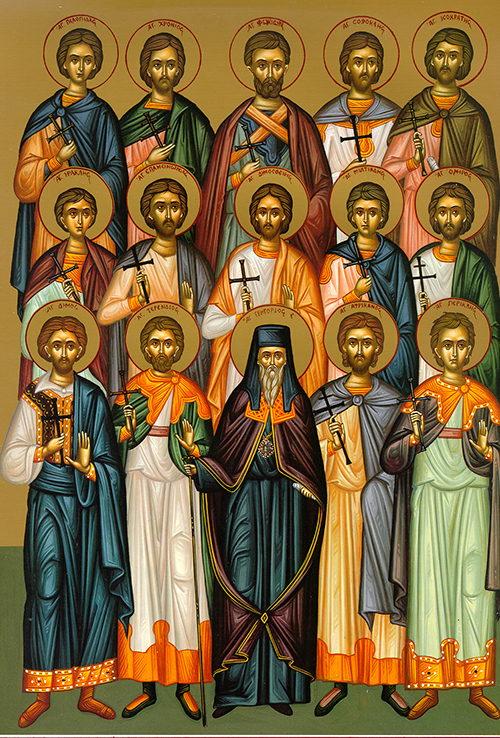

The holy martyrs Terence and his companions suffered under the emperor Decius (249-251). The emperor issued an edict commanding all subjects to offer sacrifices to the pagan idols. When Fortunianus, the governor of Africa, received this edict, he gathered the people in the city square, set out cruel instruments of torture and declared that everyone without exception had to offer the sacrifice to the idols. Many, afraid of torture, complied. However, St. Terence and forty other Christians bravely affirmed their faith in the Savior and ridiculed the idols. Fortunianus was amazed at their boldness and he asked how they, as rational people, could confess as God, One Whom the Jews crucified as a malefactor. St. Terence answered that their belief was in the Savior Who voluntarily endured death on the Cross and rose on the third day. Fortunianus saw that Terence inspired the others by his example, and so he ordered him to be isolated in prison with his three closest companions: Africanus, Maximus, and Pompeius. Fortunianus was determined to force the rest of the martyrs, including Zeno, Alexander, and Theodore, to renounce Christ.
O Lord our God, your holy martyrs have deserved the crown of immortality on account of their good fight. Armed with your strength, they have vanquished their persecutors and crushed Satan’s dreadful might. Through their supplications, O Christ our God, save our souls.
The memory of the martyrdom of Terence has come again today, and it fills all of us with joy. Let us assemble together to receive cures from him and from those who suffered with him, for they received the grace of the Holy Spirit to heal the afflictions of our souls.
Acts 1: 12-17 & 21-26
In those days they returned to Jerusalem from the mount called Olive near Jerusalem–a mere sabbath’s journey away. Entering the city, they went to the upstairs room where they were staying: Peter and John and James and Andrew; Phillip and Thomas, Bartholomew and Matthew; James son of Alphaeus; Simon, the Zealot party member, and Judas son of James. Together they devoted themselves to constant prayer. There were some women in their company, and Mary the mother of Jesus, and his brothers.
At one point during those days, Peter stood up in the center of the brothers; there must have been a hundred and twenty gathered together. “Brothers,” he said, “the saying in Scripture uttered long ago by the Holy Spirit through the mouth of David was destined to be fulfilled in Judas, the one who guided those that arrested Jesus. He was one of our number and he had been given a share in this ministry of ours.
*”It is entirely fitting, therefore, that one of those who was of our company while the Lord Jesus moved among us, from the baptism of John until the day he was taken up from us, should be named as witness with us to his resurrection.” At that they nominated two, Joseph (called Barsabbas, also known as Justus) and Mathias. Then they prayed: “O Lord, you read the hearts of men. Make known to us which of these two you choose for this apostolic ministry, replacing Judas who deserted the cause and went the way he was destined to go.” They then drew lots between the two men. The choice fell to Matthias, who was added to the eleven apostles.
John 1: 18-28
No one has ever seen God. It is God the only Son, ever at the Father’s side, who has revealed him. The testimony John gave when the Jews sent priests and Levites from Jerusalem to ask, “Who are you?” was the direct statement, “I am not the Messiah.” They questioned him further, “Who, then? Elijah?” “I am not Elijah,” he answered. “Are you the Prophet?” “No,” he replied. Finally they said to him: “Tell us who you are, so that we can give answer to those who sent us. What do you have to say for yourself?” John said, quoting the Prophet Isaiah, “I am ‘a voice in the desert, crying out: Make straight the way of the Lord!’” Those whom the Pharisees had sent proceeded to question John further: “If you are not the Messiah, nor Elijah, nor the Prophet, why do you baptize?” John answered them: “I baptize with water. There is one among you whom you do not recognize – the one who is to come after me – the strap of whose sandals I am not worthy to unfasten.” This happened in Bethany, across the Jordan, where John was baptizing.
Icon courtesy of Jack Figel, Eastern Christian Publications – ecpubs.com
Sunday, April 9 –